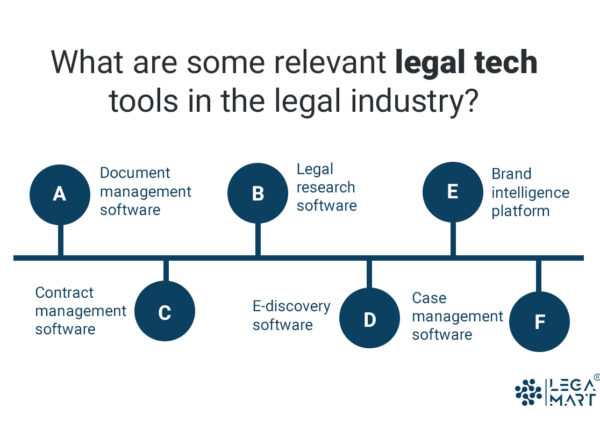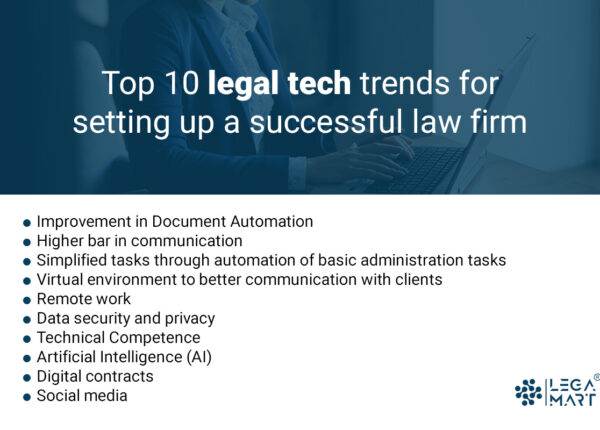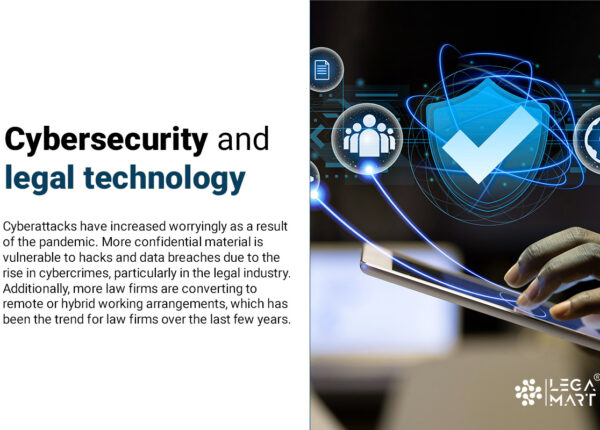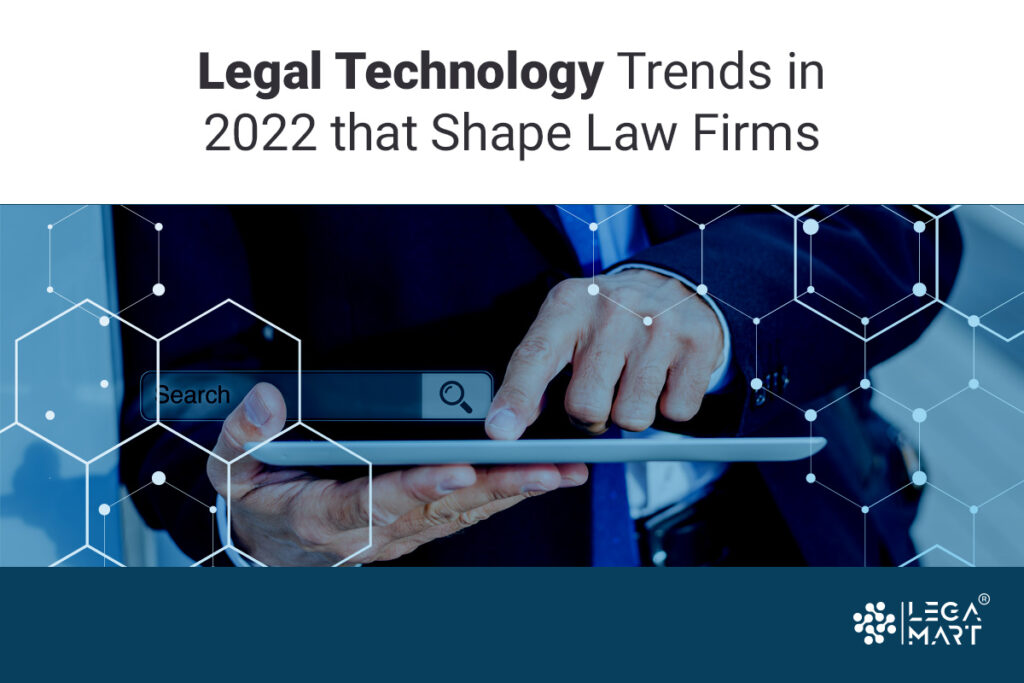- Introduction
- Legal technology (Legal tech): What is it?
- Automation: Where Legal Technology will Thrive the Most?
- What are some relevant legal tech tools in the legal industry?
- Top 10 legal tech trends for setting up a successful law firm
- What are some of the legal technology companies?
- Client portals in legal technology co.
- Clouds and Blockchains in Legal Technology
- Cybersecurity and Legal Technology
- Cybersecurity and Legal Technology
- Building a workforce with Legal Tech influence
- Concluding Remarks
Introduction
In a world where the old meets the new, the legal realm is no exception to the winds of change blowing through the technological landscape. Law firms are at a crossroads where embracing the latest legal technology trends becomes paramount. These developments simplify operations and may change how legal services were perceived earlier.
These powerful allies of law and technology, such as AI and machine learning, can analyse mountains of legal data, freeing lawyers from the shackles of tedious document review and unlocking valuable insights for case management. By harnessing AI’s prowess, legal professionals can focus on the more complex aspects of their work, such as in-depth research, client guidance, and strategic decision-making.
These immersive technologies revolutionise the legal experience, enabling jurors, judges, and lawyers to visualise evidence, reconstruct crime scenes, and present persuasive arguments in the virtual and interactive mode. It also helps clients to find themselves captivated by interactive experiences, gaining a profound understanding of the law through these captivating technological marvels.
The future beckons, and law firms must seize the moment. Embracing AI, machine learning, cloud-based platforms, blockchain technology, and data analytics will help shape the fabric of law firms. As the old and the new converge, these trends promise to redefine law practice, unleashing a wave of innovation and transforming legal services for the better.
Legal technology (Legal tech): What is it?
Legal technology, or legal tech, uses cutting-edge technologies and software to improve legal operations and services. “Legal technology” refers to using various technological tools and platforms adapted to the legal sector’s needs.
Legal technology solutions include AI, machine learning, cloud computing, blockchain, data analytics, and electronic discovery. These technologies can automate repetitive tasks, improve document management, streamline contract review and management, facilitate legal research, analyse large amounts of data, improve communication and collaboration among legal teams, and provide virtual and augmented reality courtroom presentations.
The past 2-3 years saw significant growth in legal technology trends for law firms, creating a lot of trends along the way. Legal technology has significantly altered how the industry works, as leveraging data analytics has been useful in providing data-driven insights that can be used to inform and improve decision-making by any global leader. More specifically, the sophistication of legal operations departments has increased exponentially, adding new efficiencies to the production model. In addition to improving customer satisfaction, new tools have opened up new business opportunities.
According to the nation’s leading expert consulting, the increased budget businesses in legal departments and law societies have dedicated themselves to investing in legal technology tools. After Covid-19, the industry’s strategy transformation has accelerated, and legal technology expenditure is expected to rise for law firms to boost output and productivity.
According to the survey conducted by Wolters Kluwer Legal & Regulatory, 49% of the firms are effectively utilising the technology, and 47% of the firms are in the way of transitioning their firms with all the installations of technology tools. Only 4% of organisations are lacking in the way of adopting technology.
With the development of legal technology, some new legal issues are becoming bolder and more important to be considered. Let’s take a look at some of them:
Digital Transformation
Digital transformation is integrating digital technology into all parts of a company or organisation, radically altering how it runs and offering value to stakeholders. It entails using technology to streamline operations, boost efficiency, improve customer experiences, and innovate. By adopting digital transformation, firms can adapt to changing market dynamics, remain competitive, and open new possibilities in the digital age.
Artificial Intelligence
Artificial intelligence (AI) lets computers learn, solve problems, and make judgments. Machine learning and natural language processing let computers evaluate large amounts of data, detect patterns, and forecast. In healthcare, finance, manufacturing, and customer service, AI automates tasks, improves efficiency, allows customisation, and drives innovation.
Cybersecurity
Computer systems, networks, and data are protected by cybersecurity. Cyberattacks have become a significant issue for people and enterprises as the digital world evolves. Cybersecurity procedures protect sensitive data, prevent data breaches, and maintain digital asset privacy and integrity. It includes network security, data encryption, threat detection, incident response, and user awareness training. In the digital era, robust cybersecurity measures are crucial for trust, asset protection, and risk mitigation.
Automation: Where legal technology will thrive the most!
Law firms, which once relied heavily on paper documents, now want the entire legal process to be automated and digitised with up-and-coming legal technology trends. In a legal tech setting, automated legal document review processes can save time and free internal resources for more strategic tasks. Therefore, as long as remote work exists, digitising these services will help legal departments easily manage obligations pertaining to their practice areas. However, there is a benefit to this potentially tricky task: according to the same Gartner report mentioned above, automation will cut costs associated with IT and operations by a whopping 30%!
Legal workflows are some of the most sought-after legal tech trends for law firms in 2023. A legal workflow is a series of organised, planned, and distinct procedures lawyers typically use to receive, review, and complete legal tasks. Additionally, it increases the effectiveness of providing customer service while reducing human error. A McKinsey & Company study found that 25% of this could be automated with the right task management legal tech solutions. As a result, if one wants to increase industry efficiency, this is one of the most critical tasks.
This is why it has become commonplace this year to incorporate software, especially the ones that automate task management in all legal matters, including document generation, basic contract automation, and legal research.
Also, in the survey done by the Wolters Kluwer Legal & Regulatory, among the lawyers, it was observed that 34% of the lawyers believed that their organisation is fully prepared and well-equipped for the upcoming changes in the legal market. In contrast, 50% believed they were very prepared and had confidence in their system. Automating repetitive legal processes has generally increased, making lawyers and law students more effective and efficient in their day-to-day activities.
What are some relevant legal tech tools in the legal industry?

There are many legal tech companies that provide innovative ideas to law firms and other legal services providers who automate their routine tasks to improve efficiency at reduced costs. Legal tech software refers to software specifically designed to provide legal services in the legal profession. Legal tech software aims to help law firms, other legal professionals and related service providers streamline their work processes and improve client services. Some commonly used legal tech software programs include:
Document management software
This software is also known as software-as-a-service (saas). This saas platform helps lawyers and law students to save and share documents. Some of its applications also allow users to convert documents into other formats. AI functions are also incorporated into these applications to allow them to search and extract information from documents.
Legal research software
Legal research software gives law firms access to a large database of legal information such as case law, legislation, regulations, secondary sources, and legal commentary. Legal research software may greatly minimise the time spent on manual research. Lawyers may use sophisticated search functions such as keyword searches, Boolean operators, and filters to swiftly identify important legal authorities instead of sorting through many print resources or browsing web platforms. This saves time and allows attorneys to concentrate on other important activities.
Contract management software
Contract management software streamlines and automates contract formation, negotiation, execution, and administration. These software solutions enable firms to effectively manage contract lifecycles, monitor critical dates and milestones, consolidate contract repositories, increase compliance, and improve stakeholder interactions.
E-discovery software
This software helps lawyers to manage electronic data during litigation, including retrieving evidence and reviewing enterprise data. This can be more helpful to plaintiff firms, particularly retrieved evidence that can be capitalised in helping plaintiff firms win their cases.
Brand intelligence platform
A brand intelligence platform uses technology to analyse a company’s brand performance, reputation, and market position. It gathers data from social media, online reviews, news, and competition analyses to assess customer sentiment, brand awareness, market trends, and rival plans. Businesses may improve brand strategy, make educated choices, and manage their digital reputation using this tool.
Case management software
Case management software lets lawyers centrally store and manage all pertinent case information on a single, readily accessible platform. This software includes client information, case records, filings, communications, research notes, and deadlines. All information in one location removes the need for physical files and decreases the likelihood of misplacing or losing important papers.
Additionally, task management capabilities in case management software allow attorneys to assign and monitor duties connected to their cases. Lawyers may create deadlines, assign duties, and get work reminders. This helps prioritise work, complete things on time, and avoid missed deadlines.
Top 10 legal tech trends for setting up a successful law firm

Improvement in document automation
Law firms are taking a trend of going paperless, and this is becoming the new norm. The use of hard copy files can be cumbersome and disorganised, and a transition through conversion of such files to soft copy format through scanning and uploading them to the cloud allows uniform file organisation and ease in file sharing. The goal of law firms in this era of technology is to ensure seamless sharing and access of files and documents, which helps keep up with technology trends.
Higher bar in communication
Advancement in technology has caused a rapid shift in communication as law firms have adopted online platforms such as Zoom, teams, and video tech. It is through these technologies that disposition such as client meetings and court attendance sessions are becoming easy to manage. Therefore, adopting these online platforms makes it easy for law firms and other legal tech startups to keep up with the tech industry.
Simplified tasks through automation of basic administration tasks
Most manual tasks in law firms are cumbersome and consume many available internal resources, and the same tasks can be performed with good technology and fewer resources. Law firms have identified the application of technology that automates task management, such as document sharing, filing, and record keeping, to simplify cumbersome tasks.
Remote work
Digital transformation of law firm tasks, documents, and communication makes the workforce model more seamless—from virtual meetings and court sessions to the mobility of documents and files. In addition, the need to work remotely has made it easy for lawyers to work flawlessly without sticking to the office to finish tasks.
Data security and privacy
As law firm work transitions to digital platforms, more are exposed and become vulnerable to data privacy threats and breaches; therefore, lawyers must actively secure law firms’ and clients’ confidential information.
Technical competence
Most lawyers are expected to understand the use of technology in their practice because most clients will prefer a lawyer who knows all the tools available to answer key questions applicable to the legal services offered. In this digital era, it is difficult for lawyers to find solutions to client’s problems if they do not broaden their horizons to stay relevant to legal matters by learning to leverage technology.
Artificial intelligence (AI)
Artificial intelligence helps law firms to be more efficient, especially by using AI algorithms that form patterns in data management. Additionally, Artificial Intelligence can help in revising documents and obtaining specific information to be used by lawyers. A good example is a robot lawyer. A robot lawyer is an AI-powered tool that helps in providing legal service and assistance, including legal tasks like legal research and document preparation.
Digital contracts
The rise in digitalisation has caused an increase in online Applications (Apps) which have online terms and conditions as contracts to be adhered to by consumers. Most consumers will need a lawyer to help review the contract before signing. Equally, app owners will need a lawyer to draft the digital contract for the App.
Social media
Social media plays a vital role in the public sensitisation of some ethical issues and injustices, and such information can help law firms gather evidence to prosecute perpetrators.
Currently, AI is already being used by 33% of prominent companies, with another 36% aiming to utilize it in the next three years. Although no organizations presently utilize blockchain, 70% of leading firms and 48% of transnational firms anticipate doing so during the next three years. Within two to three years, 79% of prominent companies will be adopting both predictive analytics and smart contracts.
What are some of the legal technology companies?
Legal technology companies are businesses that capitalise on leveraging proprietary data to offer innovative solutions to legal challenges. Some of these top tech companies include
DISCO: It is a legal technology business that uses artificial intelligence and cloud computing to assist attorneys and legal teams in enhancing client results. DISCO is used as an e-discovery tool for compliance, disputes, and investigations by corporate legal departments, law firms, and government organisations all around the globe.
Clio: This cloud-based practice management platform is most suitable for small and medium-sized firms. It is a Canadian startup that provides web-based solutions to law firms to help with practice administration and client interactions.
LegaMart: This platform is a one-stop solution for people seeking lawyers and lawyers looking for clients worldwide for various legal areas. It is a legal online marketplace with a closed network that connects attorneys and legal service providers with customers in foreign jurisdictions worldwide. Case Initialization, Case Progress, Case Automation, Case Monitoring, and Case Fulfillment are the foundations of LegaMart’s products.
Client portals in legal technology company
A client portal is one of the key components of legal technology. It is a rapidly evolving platform that enables firms to provide clients with access to their case information, documents, and communications, thus streamlining repetitive legal processes in client advocates’ overall engagements.
It helps law firms in many ways, including; –
Improve client communications
Client portals provide a centralized platform for law firms to communicate with their clients so that in-person meetings, emails, and phone calls are significantly reduced. Additionally, it promotes transparency as clients can access their case information and communicate with their lawyers in real time.
Document sharing
This platform is vital in legal matters as lawyers share documents with their clients. Clients can review any legal document on the platform, such as contracts and legal briefs.
Billing and invoicing
The client portal can also be useful in billing and invoicing, where clients view and pay their legal fees via the platform, making it easier for firms to streamline their accounting process.
Clouds and blockchains in legal technology
Another major player among the current legal technology trends for firms in 2020 is secure storage solutions. We’ve seen this trend for years, so it’s nothing new, given that we must emphasise its widespread adoption as a trend for 2022. Partly, this is due to the increased risk of cyber-attacks on many companies, including law firms. A move to the cloud has many advantages. For instance, attorneys can oversee and manage every aspect of their legal proceedings online, using any computer or mobile device, anywhere in the world.
Blockchain technology has been in the news recently, primarily because of its connection to Bitcoin. It provides a digital ledger that can be shared, recorded, and copied but cannot change legally. Instead of a centralised database, an integrated blockchain will collect information using a clear and accurate fixed ledger. This is perfect for legal departments that experience difficulties with a backlog of old documents.
Additionally, blockchain technology enables law firms to use digital wallets instead of escrow accounts for payments, automate ownership transactions, complete payments using cryptocurrency, and ensure that contracts and agreements between numerous parties are followed. New technology trends for firms, like smart contracts and blockchain technology, can potentially strengthen regulatory structures.
Users can also utilize it to create a network for information exchange impenetrable to hackers. Therefore, it is difficult to ignore the advantages that blockchain can offer. Blockchain-intelligent contracts also increase network security while automating legal procedures. Thus, less human intervention is required when carrying out legal procedures.
Cybersecurity and legal technology

Cyberattacks have increased worryingly as a result of the pandemic. More confidential material is vulnerable to hacks and data breaches due to the rise in cybercrimes, particularly in the legal industry. Additionally, more law firms are converting to remote or hybrid working arrangements, which has been the trend for law firms over the last few years. Law firms tend to handle sensitive client information and private case data, so cybersecurity is critical in the legal sector. Because of the increased dependence on legal technology and digital platforms, comprehensive cybersecurity measures are required to guard against cyber attacks.
Law firms have access to and are responsible for managing much information about the clients they represent. Legal professionals from these law firms should know the elevated cyber-attack risk on their local networks. They should boost their investments in toolkits that aim to reduce or eliminate these risks. It may occur due to website compromise, piracy, intrusion, or the loss or theft of a computer or smartphone.
A significant increase is evident from comparing recent figures with last year’s. Because cybersecurity affects a company’s reputation, relationships with customers, and revenue, it is one of the most significant legal tech trends for law firms. Therefore, law firms should invest in data protection by conducting comprehensive due diligence before exposing their confidential information online.
Building a workforce with legal tech influence
An increase in the diversity of profiles that law firms will hire is another one of the important trends in legal tech that we can already see. According to Gartner, there is a gap in law firms between professionals knowledgeable about internal processes and legal issues and those familiar with the technology required to analyse trends and provide actionable insights platforms to improve these recurring legal workflows. The consultant must fill this gap, which can be accomplished by creating and employing hybrid profiles.
These gaps can be filled by Offer training programs and educational resources to familiarise employees with legal technology. According to the survey, 68% of technology-leading legal and business services organizations gained profitability between 2017 and 2018, whereas just 52% of transnational firms did. Profitability also varied, with leaders more likely to have seen double-digit growth rates. And this can happen by conducting workshops, webinars, or lunch-and-learn sessions to introduce legal tech tools and demonstrate their benefits will help the lawyers grasp the technology aspects and implement them. Provide ongoing training to ensure lawyers have the necessary skills to use the technology and stay updated with new advancements effectively.
Fostering a culture of collaboration and knowledge sharing among employees will encourage open discussions about legal technology and its impact on the firm’s operations.
Concluding remarks
In 2023, we can no longer claim that the legal industry is resistant to change or has faced more challenges as law firms, particularly, have been compelled to make critical business decisions to conform to the trending technology. The industry has a unique opportunity to make the qualitative and quantitative leaps toward digital transformation that many clients from different industries have already been compelled to make.
Innovation will also be fueled by the legal sector’s increased adoption of technology trends, especially in 2023. It covers things like the attorney-client privilege, legal processing, and more.
In summary, business development leaders should invest more aggressively in legal tech, but they should also invest in more efficient methods. We can see that more and more investments by these business development leaders are at the forefront, but we must realise that the secret to the success of these investments is first to identify the issue in the first place. To make wise choices, we must look beyond current technology trends and discover the strategies that have been effective in the industry.
The consolidation of the legal tech market, coupled with astute stakeholder investments, will enable the legal industry to address the sector’s growing challenges jointly and, in turn, enhance it for the better.




